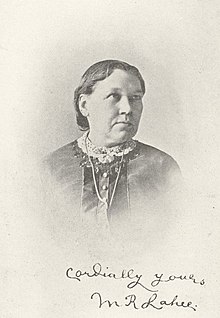Dialect Monument 3 M R Lahee

Rochdale’s importance as a centre for dialect literature is commemorated in Broadfield Park by a
memorial designed by local architect Edward Sykes to four of its key artists. It was erected in 1900.
Given that dialect writing by women in the 19 th century was almost non-existent, the name and
reputation of one of them, M R Lahee, is of particular interest.
Having been born in Carlow, Ireland in 1831 and spending a middle class and well-educated
childhood there, Margaret Rebecca Lahee moved to Rochdale as a young woman in order to be
taught millinery and dress-making by her friend Miss Kavanagh. However, being a seamstress was
not for her and she quickly turned her attention to writing, inspired in the town by Edwin Waugh
and his work which was being published around that time in the 1850’s.
Her first publication in 1859 was ‘Owd Neddy Fitton’s Visit to the Earl o’ Derby’ which Edwin Waugh
thought the best story to date in the Lancashire dialect. This was especially surprising as she had
come to that genre so recently. The tale was based on an alleged true story of someone – Neddy –
and his refusal to accept a steep rent rise from his landlord’s agent but impressing the Earl of Derby
with his character to such an extent that he renewed the lease without raising the rent. As the
literature field was so male dominated, Lahee wrote under a gender-neutral name or at first simply
using her initials MRL.

Lahee’s subsequent work beyond 1892 was drawn from the real life of those in Rochdale whom she
met, her wish being to present it in the way those people would talk to each other. Eventually she
was the author of seventeen notable works, writing well in standard English too but defending her
first dialect publication vigorously with ‘I ought perhaps to offer some apology for certain homely
words which may appear coarse and vulgar to the more fastidious reader, but as NEDDY was nobbut
a gradely straightforrad owd chap, an’ noan used to sich loike mee-maw wark as refined Literature, I
thought it but justice to him to transcribe this tale in his own plain language.’
A significant difference between Lahee’s work and other dialect writers at the time was her position
on women in society. Though filled with good humour, Lahee was not afraid to raise the difficulties
faced by women in her stories such as the financial vulnerability of widows, the working conditions
of women in the mills and in her 1887 ‘Traits and Sketches of Quaint Lancashire Folk,’ equal rights
for women. She was also a fierce supporter of the Chartist movement at a time of great radicalism in
the country and in Rochdale. Her biography of the local Chartist leader Tom Livsey published in 1866
shows her commitment to political causes as well as her championing of women’s rights.
Not all of Lahee’s work was in dialect. Her novel ‘Sybil West’ of 1893 is a fine literary achievement
setting themes of sexual harassment in the lives of women in a Lancashire mill town with great
competence. It was serialized and popularized through the pages of the Rochdale Observer between
1885 and 1886.
Lahee’s private life was unconventional and, in the end, controversial. Her live-in relationship with
Susannah Rothwell Wild that lasted for over thirty years was a problem for the Rochdale
establishment. The controversy continued after her death in 1895 when on the suggestion that a
dialect memorial was to be erected, Archdeacon Wilson opposed Lahee’s inclusion no doubt on
what to him were moral grounds. After a campaign by Susannah Wild however, Lahee was included
in this celebration of dialect writing in the town. A further controversy blew up however due to
Lahee’s wish that her partner, on her death, be buried in the same grave in Healey churchyard and
marked with the specific inscription ‘They were lovely and pleasant in their lives, and in death they
were undivided.’ Whether on grounds that she was a woman, not from Rochdale originally or
because of her sexuality it was not clear, but the local establishment refused, although Sussanah in
1896, was laid to rest in the same grave.
Lahee’s life and death were important and memorable for their commitment to literature,
particularly the dialect literature of Rochdale as well as her staunch defence of equality in social and
private life. In 1891 she wrote ‘I have laboured in the field of Lancashire literature for over half my
life-time, and have tried to bring forth the pure gold hidden beneath the surface of the people’s
nature.’